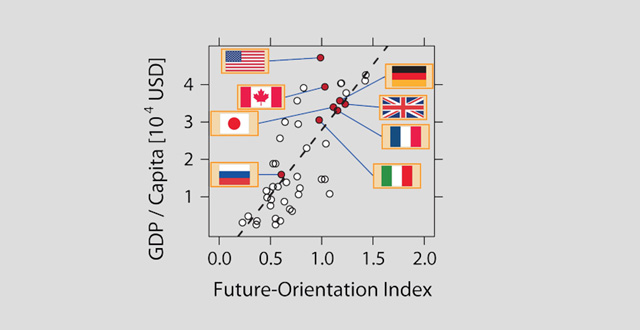An international team of researchers analyzing Google search queries has found that Internet users from countries with a higher per capita gross domestic product are more likely to search for information about the future than information about the past.

The future orientation index for 45 countries based on searches in 2010, compared with per capita GDP (Tobias Preis et al)
The findings, published in the journal Scientific Reports, link behavior of Google search users to real-world economic indicators.
“The Internet is becoming ever more deeply interwoven into the fabric of global society”, said Dr. Helen Moat, a study co-author and a research associate at the University College London. “Our use of this gigantic information resource is generating huge amounts of data on our current interests and concerns. We were interested in whether we could find cross-country differences in basic online search behavior which could be linked to real world indicators of socio-economic wellbeing, such as per capita GDP.”
The researchers analyzed Google search queries made by Internet users from 45 different countries in 2010 to calculate the ratio of the volume of searches for the coming year ‘2011’ to the volume of searches for the previous year ‘2009’, which they call the ‘future orientation index’.
They retrieved search volume data by accessing the Google Trends website, and analyzed more than 45 billion search queries carried out worldwide.
Comparing the future orientation index to the per capita GDP of each country, the team found a strong tendency for countries in which Google users enquire more about the future to exhibit a higher GDP.
“We see two leading explanations for this relationship between search activity and GDP”, said study lead author Dr. Tobias Preis, a visiting researcher at the University College London, also based at Boston University.
“Firstly, these findings may reflect international differences in attention to the future and the past, where a focus on the future supports economic success. Secondly, these findings may reflect international differences in the type of information sought online, perhaps due to economic influences on available Internet infrastructure.”







